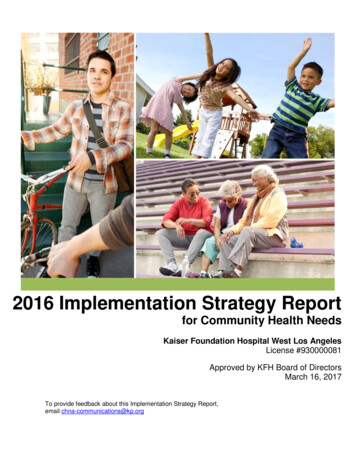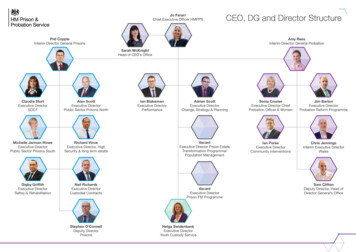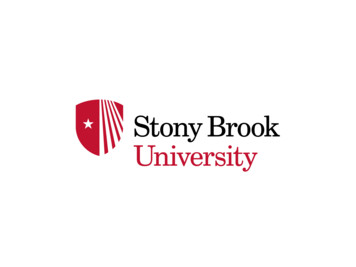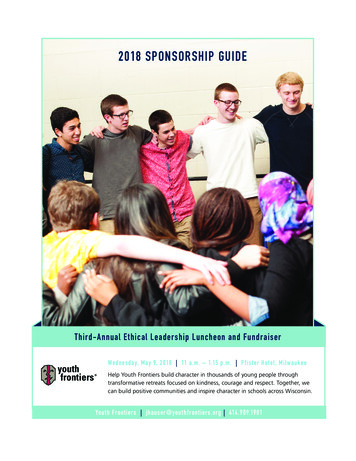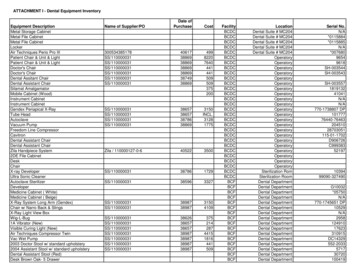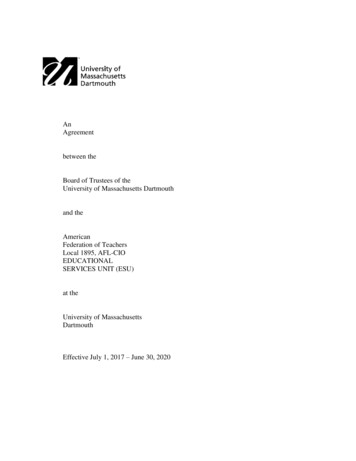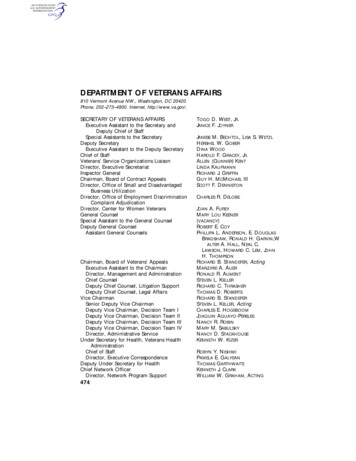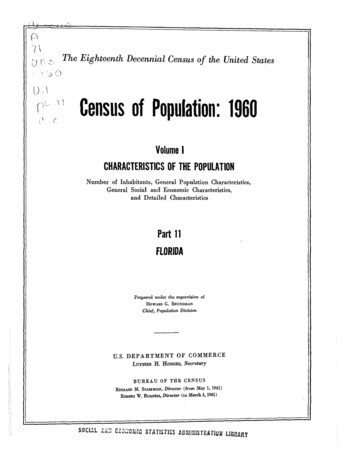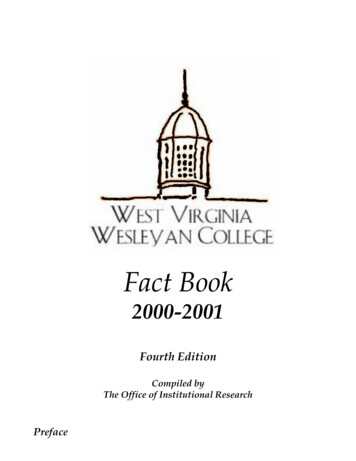
Transcription
Fact Book2000 2001Fourth EditionCompiled byThe Office of Institutional ResearchPreface
The West Virginia Wesleyan College Fact Book is a summary of statistics gathered from varioussources throughout the college. I would like to thank all of the many campus departments for theircooperation and assistance without which it would not be possible to provide this document.The purpose of the Fact Book is to provide a useful resource for commonly used information aboutWest Virginia Wesleyan College. The information included in this book comes mainly frommanagement reports and college databases. When viewing the report please pay careful attention tothe dates listed on the tables and charts.This is the fourth addition of the West Virginia Wesleyan College Fact Book. I am always looking forways to improve both the kinds of data and the presentation of the data included in this document. Ifyou have any questions about the information or suggestion for improvements I would welcome theopportunity to discuss them with you.Tammy J. Crites, M.B.ADirector of Institutional ResearchJanuary 2001Notice of NondiscriminationWest Virginia Wesleyan College, a private educational institution, is committed to the principle of equal opportunity for allqualified persons, welcomes students of all backgrounds and takes pride in the diversity of its faculty and staff. It assuresstudents of access to all the privileges, programs and activities generally accorded or made available at the College. WestVirginia Wesleyan College strongly supports affirmative action principles and does not discriminate on the basis of creed,religion, national or ethnic origin, age, race, color, gender or handicap in the administration of its educational programs,admissions policies, financial aid programs, athletics, co curricular activities or other College administered programs.2
West Virginia Wesleyan CollegeProfileWest Virginia Wesleyan College is a private non profit liberal arts college, which was founded in 1890, is accredited by theNorth Central Association of Colleges and Schools, and is affiliated with the United Methodist Church. As asserted in itsMission Statement,” West Virginia Wesleyan College is committed to challenging its students to a life long commitment todevelop their intellectual, ethical spiritual, and leadership potential and to uphold stands of excellence.”West Virginia Wesleyan College offers exceptional technological and physical facilities to create an environment ideallysuited for teaching and learning. The elegant steeple and classic Georgian design of Wesleyan Chapel set the architecturalstyle of the campus, while IBM ThinkPad computers issued to students and faculty form the keystone of a comprehensivetechnology infrastructure. Wesleyan Campus consists of 32 Buildings the oldest being Agnes Howard Hall, which wasbuilt in 1895 and is listed on the National Register of Historic Places. Among the colleges newest facilities are the FrenchA. See Dining Center, completed in 1995 and the Benedum Campus Center renovated in 1997. Below are some generalstatistics about West Virginia Wesleyan College for Fall 2000 2001.Fall 2000 Undergraduate EnrollmentFall 2000 Masters in Business Administration EnrollmentFull time UndergraduatesPart time Undergraduates148893Total Undergraduate Headcount1581Full time Graduate StudentsPart time Graduate StudentsTotal Graduate Student HeadcountFull time Undergraduate Student DemographicsStudents are from 26 countries and 35 statesMenWomenIn stateOut of stateMinorityInternational StudentsStudent in College Housing44%56%48%48%7.2%3.7%85%41Undergraduate Academic MajorsOffers 36 Academic MajorsFive most popular majors of 1999-2000 graduatesBusiness (includes Accounting, Business Admin.,Management and Marketing)Education (Elementary and Secondary)Political SciencePsychologyNursingFaculty Fall 2000Full timePart-timeFaculty HeadcountFaculty FTEStudent Faculty Ratio2219Student Activities and Organizations8664150103.913.7:1Spiritual Life ProgramsMusic, Drama, and Literary Organizations17 NCAA Division II Athletic Teams5 National Social Sororities6 National Social FraternitiesIntramural and Outdoor Recreation ProgramsCommunity Service ProgramsHonoraries and Departmental OrganizationsTuition, Fees, Room, and Board 2000 2001Yearly Tuition and Fees 18,050Yearly Room and Board 4,370Yearly Direct Costs 22,420Financial Aid Full time Undergraduates% of students applying for FA% of students receiving any FA% of students receiving gift aid% of students receiving self help aidAve. Total Student Award Package 15,568399%99%97%97%
Table of ContentsMission andOrganizational StructureWest Virginia Wesleyan College Mission Statement and AccreditationWest Virginia Wesleyan College Organizational Chart 2000-2001Board of Trustees and Executive Administrative Officers and Faculty Chair andSenate 2000-2001West Virginia Wesleyan College Faculty Constitution6789Fall 2000 New StudentsNew Student Admission Funnel and DemographicsFreshmen Academic ProfileFreshmen Tuition Discounting192021Fall 2000 Student BodyHistorical EnrollmentUndergraduate Student Headcount HistoryEthnic and Gender BreakdownFull Time and Part-time Undergraduates Declared Majors Fall 2000Student OrganizationsNCAA Division II Athletic ProgramsYearly Retention RateRetention and Graduation Rates1999-2000 Degrees Awarded by Major Field of Study232425262829303132Faculty and StaffFall 2000 Faculty General InformationFaculty by Years of Service and GenderFaculty CompensationFaculty Compensation compared to Peer GroupFaculty SalaryFaculty Salary compared to Peer GroupAcademic and Administrative Employees by Department35363738394041FinancesRevenue by SourceTuition and Fees 2000-2001Gift IncomeCurrent ExpendituresInstruction as % of Net Educational and General Expenditures4445464748FacilitiesAdministrative and Academic BuildingsStudent Residence Buildings and Occupancy Record45051
Mission and Organizational Structure5
WEST VIRGINIA WESLEYAN COLLEGEStatement of MissionWest Virginia Wesleyan College challenges its students to a life long commitment to develop theirintellectual, ethical, spiritual, and leadership potential and to set and uphold standards of excellence.Firmly rooted in the liberal arts tradition and closely related to The United Methodist Church, theCollege is a community of learning based on fundamental Principles formed at the intersections ofChristian faith and liberal education: intellectual rigor, self discovery, human dignity, mutual support,social justice, self discipline, mental and physical wellness, the appreciation of diversity and thenatural world, and the judicious use of resources. The College recognizes and affirms itsinterdependence with the external communities local, regional, national and global and its covenantwith the people of West Virginia to share its educational and cultural resources.West Virginia Wesleyan College prepares its students through its curriculum of arts andsciences, preprofessional studies, and its rich campus life programs. As a residential, undergraduateinstitution of higher education, the College aspires to graduate broadly educated men and women who·Think critically and creatively,· Communicate effectively,· Act responsibly, and· Demonstrate their local and world citizenship through service.Wesleyan AccreditationWest Virginia Wesleyan is accredited by the North Central Association of Colleges and Schools andapproved by the University Senate of The United Methodist Church. It is a member of the NationalAssociation of Schools of Music and is approved by the West Virginia Department of Education and theNational Council for the Accreditation of Teachers Education. The College participates in the InterstateCertification Project, whereby a number of states now certify teachers graduating from Wesleyan’sDepartment of Education. Wesleyan’s nursing program is accredited by the National League for NursingAccrediting Commission and approved by the State of West Virginia Board of Examiners for RegisteredNurses.The College holds memberships in the Appalachian College Association, The National Associationof Independent Colleges and Universities, the American Association of Colleges for Teacher Education,the National Association of Schools and Colleges of the United Methodist Church, Campus Compact, andthe Council of Independent CollegesWesleyan’s athletic programs are affiliated with the West Virginia Intercollegiate AthleticAssociation and the National Collegiate Athletic Association, Division II.6
West Virginia Wesleyan CollegeOrganizational Chart2000 2001Vice President forAcademic Affairsand Dean of theCollegeA ssistant Dean ofthe Colleg eDirector of Spe cialProg ram sVice President forStudent Affairsand Dean ofStudentDevelopmentBoard ofTrusteesPresidentDean of theChapelFaculty (Departments and Curriculum)Academic AdvisingAcademic PlanningHonors ProgramMBA ProgramLibraryRegistrar OfficeAssessmentInternational ProgramsStudent Services LiaisonDistance Education and Testing ProgramsSummer SessionsAdvising and Career CenterAthleticsCampus Activities and Summer ConferencesCampus Center, Outdoor Recreation and Greek LifeCampus SecurityCounseling and WellnessHealth CenterHousing and Residence LifeIntercultural RelationsNew and International Student ProgramsRetention ProgramsStudent Academic Support ServicesChapel ProgramsChurch RelationsPastoral CareSpiritual LifeVolunteer ProgramsVice President forFinance andTreasurerBookstore and Convenience Store Contracted withWallace's BookstoresBusiness OfficeComptrollerPurchasingFood Services Contracted with Aladdin Food ServicesPersonnelPost OfficePhysical Plant Contracted with Sodexho MarriottPhotocopying ServicesVice President forAdvancementAlumni and Parent RelationsAnnual Giving ProgramsGift Planning and Major Gift SolicitationCorporation, Foundation, Government RelationsMarketing and CommunicationsCampaignVice Presidentand ChiefInformationOfficerAcademic Computing ServicesAdministrative Computing ServicesHelp DeskDirector of Admission and Financial PlanningDirector of Institutional Research* As of December 31, 20007
Board of Trustees,Administrative Executive Officers and Faculty Senate2000 2001Board of TrusteesMr. Joseph S. Beeson 68, ChairmanDr. Robert S. Foltz, 1st Vice ChairDr. Arthur D. Boyd, 2nd Vice ChairRev. Patricia A. Jarvis, 3rd Vice ChairMr. Harvey P. White 55, 4th Vice ChairRev. John R. Campbell, 59 SecretaryMr. Robert L. Allman 69Mr. Michael John Aloi 80Ms. Suzan E. Bly 68Ms. Mary Lou Greenwood Boice 81Mr. Roger Brown 63Ms. Allyson Burnell 85Mr. K.C. Caldabaugh 68Ms. Christine Cox 69Mr. Thomas B. Dunn 64Mr. Charles R. Evans 69Mr. Ben Exley IV 68Mr. Charles W Furbee III 64Mr. William O. GoodwinMr. William R. HadenRev. Andrew C. HarveyBishop S. Clifton IvesRev. David JasperBishop Hae Jong KimMrs. Mary Jean Krupowicz 71Dr. Brooks Mc CabeRev. Douglas S. Miller 59Mr. William W. MinskerDr. Charolette L. Nath 68Mr. William S NormanMr. James Phillips 02Mr. David E. Reemsnyder II 69Mr. Herschel H. Rose IIIRev. Vance P. Ross 79Dr. Robert 0. RuppDr. Roger L. SmithDr. Joseph M. Shreve 74Rev. Victoria J. Starnes 78Sir John W. Swan 60Mr. Harry A. Wallace IIIDr. William H. Wilson 72President’s CabinetMr. William R. Haden, President of the CollegeDr. Richard Weeks Jr., Vice President for Academic Affairs and Dean of the CollegeMr. G. Michael Goins, Vice President for Finance and TreasurerDr. Trina Dobberstein, Vice President for Student Affairs and Dean of Student DevelopmentMr. Duwane Squires, Vice President and Chief Information OfficerMs. Peg Cooning, Vice President for AdvancementDr. Mary Jo Sims Baden, Dean of the ChapelMr. Robert N. Skinner, II, Director of Admission and Financial PlanningMs. Tammy Crites, Director of Institutional ResearchFaculty Chair and SenateDr. Robert Rupp, Faculty ChairDr. Vicki Phillips, Vice Chair, Faculty SenateMs. Margaret Davis, Faculty SenatorDr. Melody Meadows, Faculty SenatorDr. John Saunders, Faculty SenatorDr. Carl Colson, Faculty SenatorMr. Larry Reed, Faculty Senator8
WEST VIRGINIA WESLEYAN COLLEGE FACULTY CONSTITUTIONPREAMBLEThe purpose of this Constitution shall be to give voice to the faculty of West Virginia Wesleyan Collegein shaping, implementing and monitoring the mission of the College, in particular its academic mission.ARTICLE I. ORGANIZATIONSection 1. The Faculty Assembly, Faculty Senate, Admission and Academic Affairs Council, CampusLife Council, Curriculum Council, Professional Affairs Council, and other faculty committees as provided for inArticle VI of this Constitution are governed by the West Virginia Wesleyan College Faculty Constitution.Faculty Assembly retains the right of review of all actions of the Faculty Senate, councils and committees,except as specifically stated below. The Faculty Senate serves as the executive committee of Faculty Assembly.Section 2. All meetings of the Faculty Assembly, the Faculty Senate, councils and committees authorizedunder this Constitution shall be conducted according to the procedures set forth in Robert's Rules of OrderNewly Revised. The Chair of the Faculty shall appoint a parliamentarian annually to advise on matterspertaining to meetings of the Faculty Assembly.Section 3. Any voting member of the Faculty Assembly may observe the proceedings of any council orfaculty committee, except the Professional Affairs Council. The chair of any council or faculty committee maygrant permission to other interested parties to observe proceedings.ARTICLE II. FACULTY ASSEMBLYSection 1. Purpose and Scope of AuthorityThe Faculty Assembly shall be the chief deliberative and legislative body of the faculty. It may consider and makerecommendations on all matters of general interest to the college community; however, it shall have primaryresponsibility for matters related to the College's program of instruction. All actions of the Faculty Assembly aresubject to review by the President of the College. Should the President disapprove of any action, the Presidentshall consult with the Chair of the Faculty and, if appropriate, the originating council or committee. Any action bythe President that overturns legislation of the Faculty Assembly shall be reported to the Faculty Assembly.Section 2. MembershipAll who serve full time or pro rata under a faculty contract as provided for in the Faculty Handbook, the Dean ofthe College, and the President of the College shall be voting members of the Faculty Assembly. Any full timefaculty member assigned to a term appointment in an administrative position shall retain voting privileges inFaculty Assembly. [10/1/98] The Faculty Senate shall be charged with resolving questions regarding any facultymember's voting status. Only voting members of the Faculty Assembly may submit motions, amendments, orresolutions. Voting members of the Faculty Assembly may exercise their franchise in person only.9
All others offering formal instruction at the College, either part time or by special arrangement; faculty emeriti;administrative officers; and the President of the Community Council shall be non voting associate members withvoice.Section 3. MinutesMinutes shall be kept of all meetings of the Faculty Assembly, distributed to all members and associate membersof the body at least forty eight hours prior to its next meeting, and approved by the body at its next scheduledmeeting. Stenographic support may be provided by the Office of the Dean of the College. Approved minutes ofthe Faculty Assembly shall be submitted to the President of the College.Section 4. MeetingsThe Faculty Assembly shall meet no fewer than eight times during the academic year. The Chair of the Facultyshall call special meetings as necessary with at least forty eight hours notice. The Chair of the Faculty shallconvene special meetings, also with forty eight hours notice, upon receipt of a request signed by twelve or morevoting members of the Faculty Assembly. Meetings of the Faculty Assembly shall be chaired by the Chair of theFaculty or, in the Chair's absence, by the Vice Chair of the Faculty.Section 5. AgendaThe agenda for all meetings of the Faculty Assembly shall be prepared by the Chair of the Faculty in consultationwith the Faculty Senate and distributed in writing via campus mail to all members of the Faculty Assembly notlater than forty eight hours prior to the time of the meeting. The agenda shall include all resolutions or mainmotions passed by the councils and committees which have been reviewed by the Faculty Senate. Any member ofthe Faculty Assembly may submit in writing to the Chair of the Faculty items for the agenda. Resolutionsintroduced on the floor of the Faculty Assembly without prior notice shall be added to the agenda of a subsequentmeeting unless the body waives the forty eight hour notice provision by a majority vote.Section 6. QuorumA quorum of the Faculty Assembly shall consist of forty percent of its voting members.ARTICLE III. FACULTY SENATESection 1. Purpose and Scope of AuthorityThe Faculty Senate shall be the executive committee of the Faculty Assembly. All actions of the Faculty Senateare subject to review and approval by the Faculty Assembly.Section 2. MembershipFaculty Senate shall be comprised of five faculty representatives elected by the Faculty Assembly from its votingmembers, the Vice Chair of the Faculty, and the Chair of the Faculty, who shall also chair the Faculty Senate. (SeeArticle V. Elections, pp. 3 4.) The representatives shall serve staggered two year terms. The person elected to theoffice of Vice Chair of the Faculty shall serve as Vice Chair and Secretary of the Faculty Senate for one year andthen as Chair for one year. The Dean of the College shall be a non voting ex officio member of the Faculty Senate.A quorum of the Faculty Senate shall10
consist of five of its voting members. The Faculty Senate shall meet at least eight times during the academic year.Section 3. Other Interested PartiesThe Chair of the Faculty may invite any member of the faculty or administration to sit as a consultant without votefor any single meeting of the Faculty Senate. The Faculty Senate may hold hearings with any interested person(s)concerning proposed legislation or significant campus issues.Section 4. Duties and ResponsibilitiesThe Faculty Senate shall be responsible for representing the interests of the faculty regarding all aspects of theCollege's mission and program. The Faculty Senate may also inquire into matters concerning the faculty which arenot strictly within the faculty's traditional purview e.g., details of the College's financial condition.A.When appropriate, the Faculty Senate shall direct matters that come to its attention to the councils orcommittees with jurisdiction over these matters. The Faculty Senate shall also act as an oversightbody with the right of review of the activities of the councils and faculty committees.B.Action taken by councils and faculty committees shall be reviewed by the Faculty Senate and (1)sent to the Faculty Assembly for possible review, or (2) sent to the Faculty Assembly for possiblereview with a recommendation from the Faculty Senate, or (3) referred back to the appropriatefaculty body for further consideration.C.The Faculty Senate shall appoint faculty members to councils and shall coordinate with the variouscouncils the appointment of faculty members to faculty committees. (See Article V, Section 1.)(Student members of councils and faculty committees shall be designated by the CommunityCouncil.)D.The Faculty Senate may create or dissolve special faculty committees related to the carrying out ofits duties and responsibilities. Committees created by the Faculty Senate for a specific purpose shallreport to the Faculty Senate. Any such committee shall continue to exist only until it shall completeits assigned task or until the Faculty Senate shall dissolve it.E.The Faculty Senate shall initiate and encourage sharing of information and reports as appropriatefrom college committees whose authority originates outside the Faculty Constitution and from theDepartment Chairs' Caucus. The Faculty Senate shall share information with the Faculty Assemblyas appropriate.ARTICLE IV. ELECTION OF FACULTY OFFICERSThe election of faculty officers and members of the Faculty Senate shall occur each year during the March meetingof the Faculty Assembly. Election shall be by secret, written ballot, with each voting member of the FacultyAssembly casting as many votes for a given position as there are vacancies for that position. Elected officers willassume office at the conclusion of the April meeting of the Faculty Assembly. All members appointed to councilsand committees will assume office at the Fall Faculty Retreat, and an initial meeting of each council shall takeplace at the Retreat. [12/4/97]Section 1. Chair of the FacultyThe Vice Chair of the Faculty shall assume the office of Chair of the Faculty at the conclusion of the April meetingof the Faculty Assembly. In the event that the Vice Chair is unwilling or unable to assume the responsibilities ofChair of the Faculty, the Faculty Assembly shall elect a new Chair by majority vote.Section 2. Vice Chair of the Faculty11
The Vice Chair of the Faculty shall be elected annually during the March meeting of the Faculty Assembly.Nominations by voting members of the Faculty Assembly shall be accepted from the floor during the Februarymeeting until the closing of nominations during that meeting.Section 3. Faculty SenateAt the first regularly scheduled meeting of the Faculty Assembly following January 1 of each year, a nominatingcommittee of five voting members of the Faculty Assembly not currently serving on Faculty Senate shall beelected at large. The nominating committee shall be charged with presenting to the Faculty Assembly a slate ofcandidates equal in number to the number of vacancies on the Faculty Senate, plus one. It shall be theresponsibility of the nominating committee to present a diverse slate of candidates that represents the variousinterests, points of view, and academic disciplines of the Wesleyan faculty, with no more than one candidate froma single academic department. The slate of candidates presented by the nominating committee shall be publishedwith the agenda for the March meeting of the Faculty Assembly. Nominations shall also be accepted from thefloor from any voting member of the Faculty Assembly during the March meeting. All persons nominated shallrun at large, and election to the Faculty Senate shall be by a plurality of votes.Section 4. VacanciesA.Members who anticipate absence from meetings of the Faculty Senate for one semester or more shallbe obligated to resign their positions for the remainder of their term.B.Should any member of the Faculty Senate resign or fail to serve, the Faculty Assembly shall fill thevacancy by election at the next scheduled meeting of the Faculty Assembly. The person so electedshall fill the remainder of the unexpired term. Determination of "failure to serve" shall be made bythe Faculty Senate.ARTICLE V. COUNCILSSection 1. Purpose and Scope of AuthorityA council is a standing body operating under the jurisdiction of the Faculty Constitution that has oversight over abroad sector of the College's program. As such, a council has broad, ongoing responsibility for formulating andmonitoring policy related to its stated area of concern. The Faculty Constitution provides for four councils:Admission and Academic Standing Council, Campus Life Council, Curriculum Council, and Professional AffairsCouncil. The Faculty Assembly may create new or dissolve existing councils as it deems necessary. The FacultySenate shall refer to the appropriate council for study and/or action matters that fall within the jurisdiction of thatcouncil.A council may create or dissolve without outside approval subcouncils to facilitate the carrying out of itsresponsibilities. A subcouncil is a working group of council members formed to advise, bring recommendationsand/or monitor a specific aspect of the council's area of concern. Any subcouncil created by a council derives itsauthority from the council and shall report to the council on a regular basis.A council may also recommend to the Faculty Senate the creation of faculty committees to deal with specificaspects of the College's program that merit special faculty attention, or their dissolution. A council also shallrecommend individuals for membership on faculty committees; however, appointment to a faculty committee shallremain the prerogative of the Faculty Senate, which shall be accountable for assuring the fair and reasonabledistribution of the faculty's out of classroom workload.Section 2. General Requirements Applicable to all CouncilsA.Organization1.Members of each council shall be appointed by the Faculty Senate to reflect reasonablediversity, including diversity among the several academic disciplines.12
B.C.2.All members of a council shall have voice and vote, except as specified below.3.With the exception of the Curriculum Council, which shall be chaired by the Dean of theCollege, each Council shall elect its own chair and secretary from among its voting facultymembers.4.A council may invite non members to provide information or consultation or to attend anysingle meeting.5.Any voting member of the Faculty Assembly may observe the proceedings of any council,except the Professional Affairs Council; observers may not participate in the proceedingsexcept as invited.Procedures1.With the exception of action taken by the Professional Affairs Council on personnel matters,all action taken by a council shall be subject to review by Faculty Senate, the FacultyAssembly, and the President of the College. Unless overturned upon review, action taken by acouncil shall be considered binding.2.When issues rightly before a council also affect the area of responsibility of another facultybody, the council shall confer with that body before forwarding any action to the FacultySenate.Minutes and Reports1.Minutes shall be kept of all council meetings and approved by council members. Except forthe minutes of the Professional Affairs Council, these minutes, or a summary of actions taken,shall be distributed in a timely manner to the Faculty Senate for review and forwarding to theFaculty Assembly.2.Each council shall submit to the Faculty Senate with its first set of minutes each year a reportof its goals for the year; with its final set of minutes for the year, each council shall submit anevaluation of its progress toward achieving those goals.3.Each council shall submit to the Faculty Senate for distribution to the Faculty Assembly a one page written summary of its activities for the year, including frequency of meetings,accomplishments, and recommendations, in April of each year.Section 3. Admission and Academic Standing CouncilA.MembershipThe Admission and Academic Standing Council shall consist of six voting members of the FacultyAssembly appointed by the Faculty Senate for staggered three year terms, the Director of AcademicAdvising, the Dean of Student Development or the dean's representative, the Director of Admissionor the director's representative, the Dean of the College, and the Registrar. Only faculty membersshall have the vote.B.Duties and ResponsibilitiesThe council shall be responsible for formulating policy and establishing and monitoring standardsaffecting admission to the College and the academic standing of enrolled students. The council alsoshall act on individual requests for variance from stated policies and/or requirements. On policyquestions relating to standards for admission, academic standing, or graduation, the council must beconsulted before any action is taken by any other person or group on campus.13
1.The council shall recommend candidates eligible for graduation, whose names shall besubmitted to the Faculty Assembly for approval.2.In consultation with the Director of Admission, the council shall determine when it must ruleon individual applications for admission to the College, and it shall render decisions onapplications referred to it by the Director of Admission.3.The council shall formulate policies governing academic matters such as credit byexamination, withdrawal from courses, and readmission to the College following dismissal forany cause.4.The council shall formulate policies and establish and monitor standards affecting academicstanding, including honors recognition, probationary status, and academic dismissal. As soonas final grades are available at the end of each semester, the council shall determine thosestudents who are ineligible to return the following semester and those who are to be placed onacademic probation or warning. The Dean of the College shall communicate the council'sdecisions to affected students at the earliest possible date.5.The council shall serve as the primary authorizing body on individual requests for variancefrom established academic policies and/or standards. The council's actions in such cases shallbe subject to appeal to the Dean of the College. Should the Dean of the College overturn thecouncil on any matter, the dean shall inform the committee in writing in a timely manner.Section 4. Campus Life CouncilA.MembershipThe Campus Life Council shall consist of five voting members of the Faculty Assembly appointedby the Faculty Senate for staggered three year terms, the faculty representative to CommunityCouncil appointed annually by the Faculty Senate, the Dean of Student Development or the dean'srepresentative, the Dean of the Chapel, the Director of Athletics, the Director of the Counseling andthe Wellness Center, and three students appointed annually by the Community Council.B.Duties and ResponsibilitiesThe council shall be responsible for the ongoing evaluation of the various programs, policies,procedures and facil
The West Virginia Wesleyan College Fact Book is a summary of statistics gathered from various sources throughout the college. . Men 44% Five most popular majors of 1999- 2000 graduates . Christian faith and liberal education: intellectual rigor, self discovery, human dignity, mutual support, .

